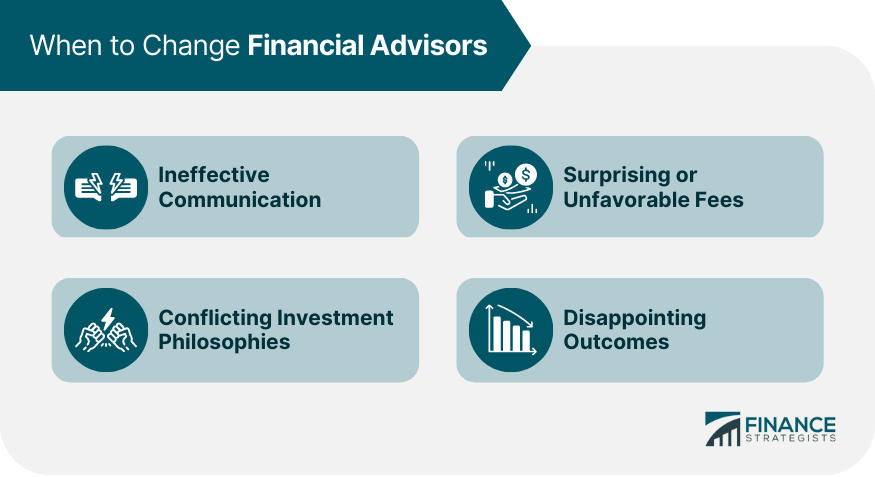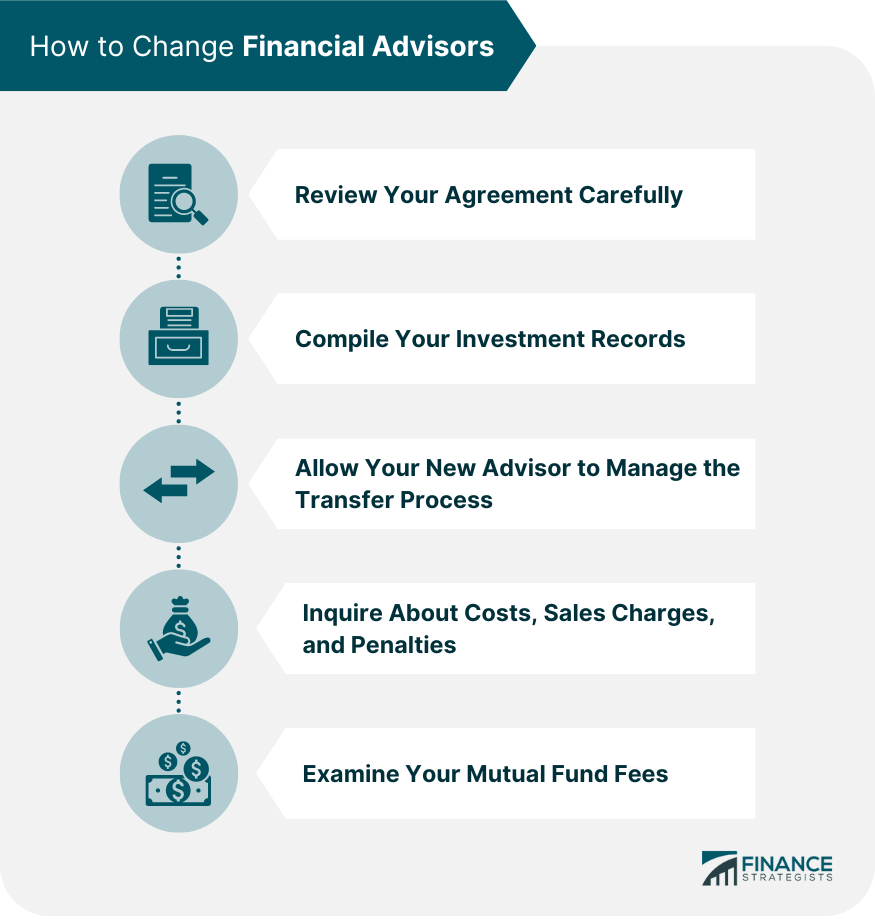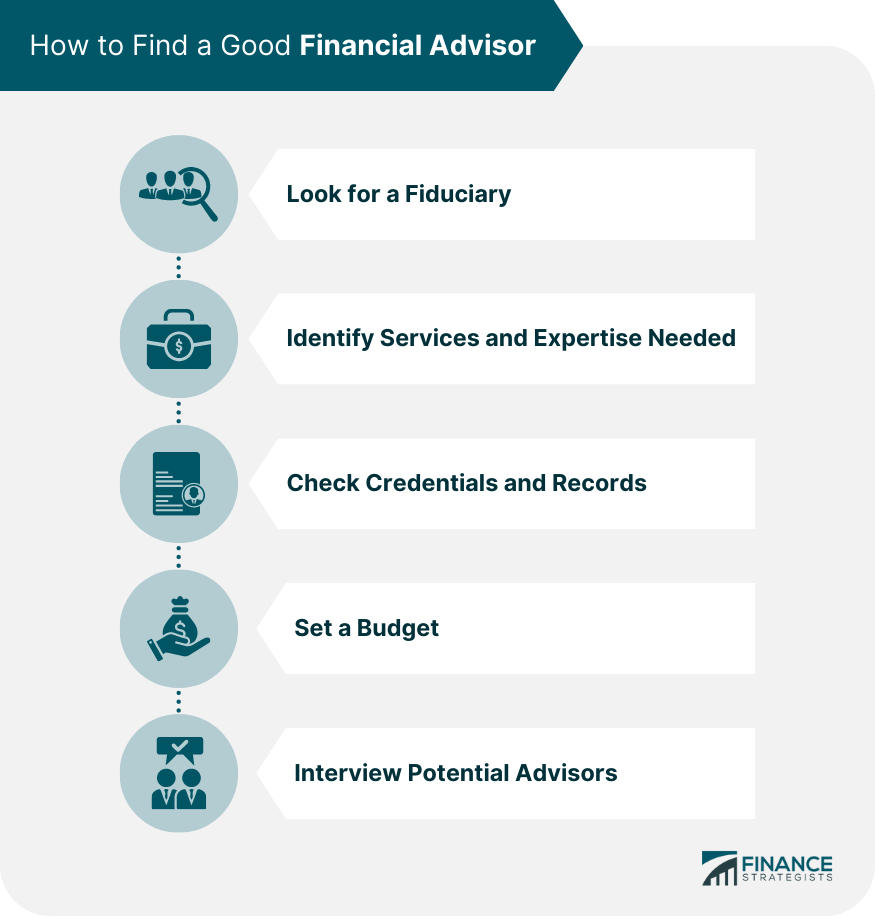The decision to work with a financial advisor is made after meticulous consideration. You account for your financial situation, risk tolerance, and life goals. You ensure that the advisor you choose is a good fit for your ever-changing individual needs. A good financial advisor can be a tremendous asset in helping you meet your financial goals, while a bad one can cost you valuable time and money. It is crucial to regularly assess the quality of any advice you receive from such professionals you entrust with your finances. Nonetheless, even when you have taken care to select the right advisor, there may come a time when it is necessary to switch to another or move on altogether. Consider the following guideposts to know when a change is needed: The ability to communicate effectively and explain complex financial concepts in a way that is easy to understand is essential. Your advisor should be attentive to your questions and patient with your queries, providing logical answers and coherent explanations. Periodic communication is key. At a minimum, there should be a yearly review of your finances, but certain changes in your life or financial situation may require more frequent meetings. The method is irrelevant. You can discuss things in person, over the phone, or online. What is important is that communication is clear and expeditious, with ample opportunity for you to ask questions and receive answers that do not leave you feeling confused. Your advisor should also make you comfortable sharing concerns or issues regarding results or plans. When communication is unsatisfactory, or you consistently feel ignored, it may be time to look for a new advisor. You expect fees when working with a financial advisor. You may pay recurrent management fees or be charged commissions if you buy assets for your portfolio. Such fees are discussed and agreed on before the start of the relationship. As such, the fees should be reasonable, transparent, and fair. The cost of financial advisor services should also align with the complexity of your portfolio or investments. Review your fee structure regularly to avoid being surprised by additional costs down the road. If you feel you are being overcharged or taken advantage of, it is best to move on and find an advisor who better suits your goals and budget. Your financial advisor should be familiar with your risk profile and the type of investments you are interested in, whether that is stocks, bonds, mutual funds, or real estate. Your relationship should be dynamic, with room for changing life circumstances. For example, getting married and having kids can affect your risk tolerance and overall financial goals, and your advisor needs to adjust accordingly. If your financial advisor's investment philosophy does not correspond with what you currently want from your portfolio and finances, it may be time to move on. At the onset of your relationship, you and your financial advisor put together a plan that considers your financial situation and future goals. You may want to buy a house, save for retirement, get out of debt, or reach a certain return on your investment portfolio. Your financial advisor should monitor your progress and update you on whether you are on track to reach your goals. For example, investment returns can be affected by circumstances beyond your control, like the stock market going down. An excellent financial advisor provides innovative solutions if things are not going as expected. Think about switching financial advisors if there is a consistent pattern of underperformance or a lack of transparency regarding the strategy being used. When you decide to move on from your financial advisor, remember the following for an orderly transition: The statement of understanding or contract you signed with your financial advisor will be extremely helpful regarding the specifics of changing advisors. It should include information on how long the contract period lasts and any other applicable conditions, such as those regarding the transfer of accounts to a new institution. It should also provide details on how you go about informing your financial advisor of the termination of your contract. Typically, you need a signed notice or letter to start the process. Some firms may also charge a termination fee. Before switching financial advisors, make sure you have all the necessary records. Gather copies of your tax returns, account statements, and other documents pertaining to your investments. Firms are required to give you copies of your complete investment history, so do not be afraid to ask for these records. In addition, if your financial advisor is managing your assets for you, paperwork may be required so you can transfer your money to a new brokerage firm or bank. Be sure to have all this vital information on hand when requesting advice from or transferring management of your assets to a different financial advisor. You may not need to arrange the transfer yourself if you have already picked a new financial advisor. Your new advisor can assist you with the transition, including processing through the automated customer account transfer service (ACATS). The ACATS system helps manage the transfer of accounts, including mutual funds and stocks. Your new advisor can provide you with further guidance, as this is a complex process. Transferring to a new firm takes time. Be sure to stay in touch with both advisors throughout the entire process. This ensures that everything goes smoothly and according to plan. Understanding all the costs and charges involved with transferring your investments is important. Most brokerage firms have internal policies regarding sales charges and termination fees when you switch advisors. The type of investments you hold may also incur additional transfer or early withdrawal penalties, so make sure to ask your outgoing financial advisor about such potential liabilities upfront. If you are invested in a mutual fund under the old firm, fees should be examined before you move your account. Many funds charge an exit fee, or a contingent deferred sales charge if you withdraw money early. These charges can range from 5% or more, depending on the type of funds and their associated policies. Make sure to understand these potential costs in advance so that you are aware of any deductions from your accounts once the transfer is complete. You may want to maintain a mutual fund with the old firm and wait out the holding period if you deem you will lose money compared to the earnings when you transfer outright. A failed relationship with a financial advisor should not discourage you from finding a new and better one. Consider the following tips: A fiduciary is a financial advisor who has to abide by certain rules and regulations, such as acting in the best interests of their clients. Fiduciaries are required to disclose any conflicts of interest that may affect their advice. Finding a fiduciary can give you peace of mind when investing with an advisor. Check with the Securities and Exchange Commission (SEC), Financial Industry Regulatory Authority (FINRA), and your state's regulators to determine if a prospective financial advisor is a real fiduciary. Ensure you know what services, investments, and guidance you need. Consider the level of help your financial goals demand and whether or not you require expertise in any particular area. You may only want someone who can provide basic financial advice, such as budgeting tips and retirement planning. Or perhaps, you need an advisor knowledgeable about securities investing or extensive experience working with high-net-worth clients. Once you have identified a potential financial advisor, research their credentials and records. Verify any claims they make regarding education, experience, and qualifications using the SEC's Investment Adviser Public Disclosure (IAPD) tool or FINRA's BrokerCheck database. Also, probe if any past disciplinary action has been taken against them by regulatory agencies. Before hiring a financial advisor, set a budget for your required services. Financial advisors charge different rates depending on the complexity of your needs, so have an idea of what you can afford before agreeing to any long-term contracts or agreements. Ask potential advisors about fee structures and find out if they have any packaged services to help you save money. After narrowing down your choices, interview each financial advisor to get a feel for their investment philosophy and how they would handle your account. This is an opportunity to get to know the advisor and ask any remaining questions you have about fees, services, and experience. You should also inquire about their investment process, such as how they develop portfolios and what type of asset allocation models they use. Ask them to provide references from past clients to get first-hand feedback about working with the advisor. A financial advisor should help you manage your money and make financial decisions. Remember that not all financial advisors are equal. Knowing when to end a prior arrangement with one can save you valuable time and money and bring you closer to your financial goals. Red flags can include inefficient communication, hidden or unfavorable fees, conflicting investment philosophies, and disappointing outcomes. If you see one or all of these signs, it is time to switch to a new advisor. Before transferring to another financial advisor, you should review previous agreements, compile documents, and inquire about costs, penalties, and other fees to ensure a smooth process. Lastly, do your due diligence in choosing a new advisor and check fiduciary standards, identify services needed, consider your budget, examine backgrounds, and interview candidates. It will give you peace of mind that your financial advisor can deliver this time.When to Change Financial Advisors
Ineffective Communication
Surprising or Unfavorable Fees
Conflicting Investment Philosophies
Disappointing Outcomes

How to Change Financial Advisors
Review Your Agreement Carefully
Compile Your Investment Records
Allow Your New Advisor to Manage the Transfer Process
Inquire About Costs, Sales Charges, and Penalties
Examine Your Mutual Fund Fees

How to Find Good Financial Advisors
Look for a Fiduciary
Identify Services and Expertise Needed
Check Credentials and Records
Set a Budget
Interview Potential Advisors

The Bottom Line
When & How to Change Financial Advisors FAQs
Terminating your relationship with a financial advisor can be done easily. Generally, you just need to contact them and inform them in writing that you no longer require their services. After this, all communication between the two of you will cease. Depending on the type of account or investments held, your financial advisor may also need to mark certain accounts as inactive.
Qualifications such as experience, credentials, and disciplinary records are crucial. You should also consider their ability to communicate, understand your needs, and provide advice that fits with the goals you have set out. It may also be worth considering reviews from former clients.
If there is ineffective communication, hidden or extravagant fees, differing investment philosophies, or disappointing outcomes, consider switching to a new financial advisor.
Yes. Depending on the type of advisor you are working with and the services they provide, there could be a fee for switching advisors or closing accounts. It is important to thoroughly read all of your current financial documents (such as contracts) to understand what fees might be incurred when making the switch.
Identify the services you need and what you can afford to pay. Look for fiduciaries and check their backgrounds and credentials through different government regulators. It is also wise to interview potential advisors to make an informed decision.
True Tamplin is a published author, public speaker, CEO of UpDigital, and founder of Finance Strategists.
True is a Certified Educator in Personal Finance (CEPF®), author of The Handy Financial Ratios Guide, a member of the Society for Advancing Business Editing and Writing, contributes to his financial education site, Finance Strategists, and has spoken to various financial communities such as the CFA Institute, as well as university students like his Alma mater, Biola University, where he received a bachelor of science in business and data analytics.
To learn more about True, visit his personal website or view his author profiles on Amazon, Nasdaq and Forbes.















